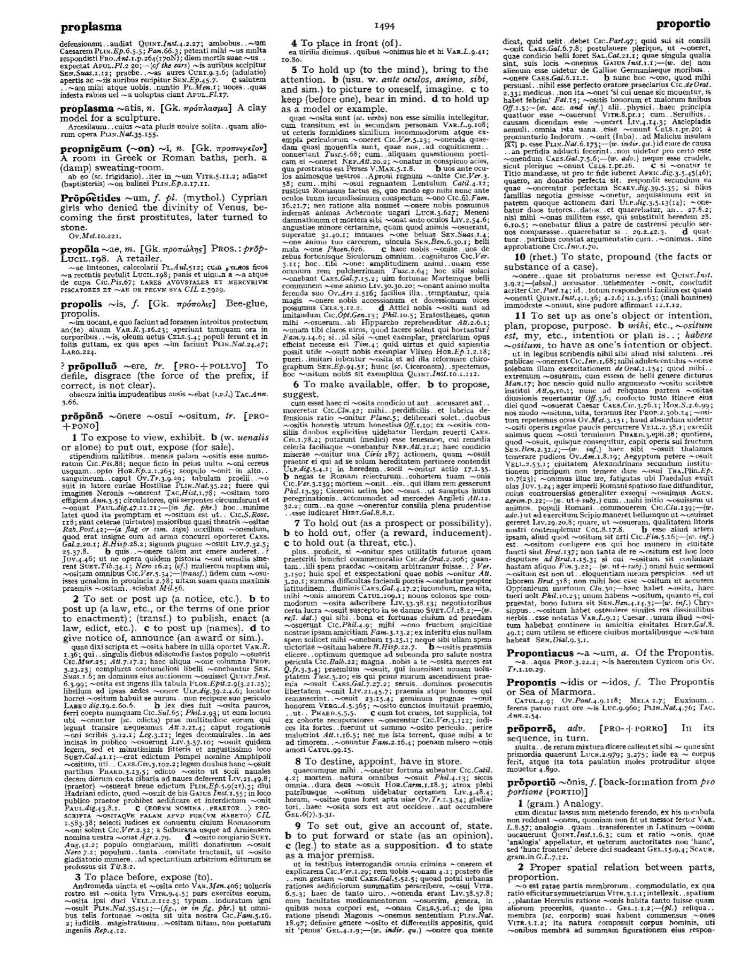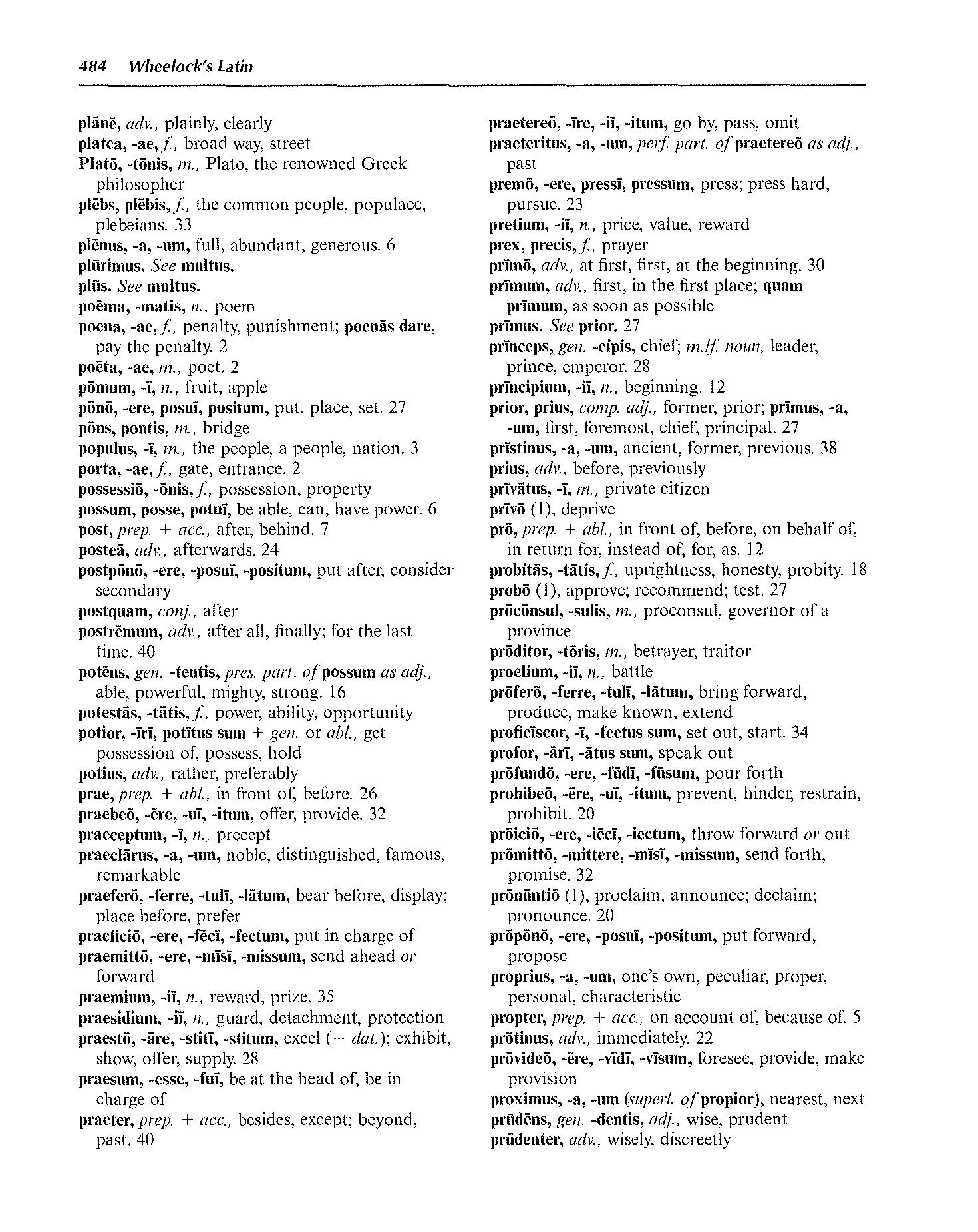
page_listing.tpl
page_subListingDetails.tpl
sub_listingDetails_style1.tpl
sub_listingDetails.title.tpl
prōpōnere to put forward
prōpōnere is a Latin Verb that primarily means to put forward.
Definitions for prōpōnere
Wheelock's Latin
Verb
- 1
put forward, propose
Oxford Latin Dictionary
Verb
- 1
To expose to view, exhibit. (b) (w. uenalis or alone) to put out, expose (for sale).
- 2
To set or post up (a notice, etc.). (b) to post up (a law, etc., or the terms of one prior to enactment); (transf.) to publish, enact (a law, edict, etc.). (c) to post up (names). (d) to give notice of, announce (an award or sim).
- 3
To place before, expose (to).
- 4
To place in front (of).
- 5
To hold up (to the mind), bring to the attention. (b) (usu. w, ante oculos, animo, sibi, and sim.) to picture to oneself, imagine. (c) to keep (before one), bear in mind. (d) to hold up as a model or example.
Sentences with prōpōnere
Latin to English
Rursus, quid virtus et quid sapientia possit, utile proposuit nobis exemplar Ulixen.Compare Again, of the power of virtue and wisdom he has given a profitable example in Ulysses.
Pars hominum vitiis gaudet constanter et urget propositum; pars multa natat, modo recte capessens, interdum pravis obnoxia.Compare A part of the world finds its pleasure consistently in vice and keeps steady to its purpose. Another and a larger part wavers, at one moment setting its hands to what is right, at another giving way to evil.
Quid est igitur propositum his rei publicae gubernatoribus, quod intueri et quo cursum suum derigere debeant?Compare What then is the objective of those who are at the helm of government, which they should never lose sight of, toward which they ought to set their course?
Sine auctore vero propositi libelli nullo crimine locum habent debere. Nam et pessimi exempli, nec nostri saeculi est. (Traianus Plinio)Compare Information without the accuser's name subscribed must not be admitted in evidence against anyone, as it is introducing a very dangerous precedent, and by no mean agreeable to the spirit of the age. [Trajan to Pliny, on Christians]
Eratosthenes, qui ego propono, a Serapion et ab Hipparchus valde reprehendo.Compare Eratosthenes, whom I had proposed to myself as an example, is greatly blamed by Serapion and by Hipparchus.
Conjugation table for prōpōnere
Cactus2000
| ACTIVE | |
| Indicative present | Indicative imperfect |
| prōpōnō prōpōnis prōpōnit prōpōnimus prōpōnitis prōpōnunt | prōpōnēbam prōpōnēbās prōpōnēbat prōpōnēbāmus prōpōnēbātis prōpōnēbant |
| Indicative perfect | Indicative pluperfect |
| prōposuī prōposuistī prōposuit prōposuimus prōposuistis prōposuērunt / prōposuēre | prōposueram prōposuerās prōposuerat prōposuerāmus prōposuerātis prōposuerant |
| Indicative future | Indicative future perfect |
| prōpōnam prōpōnēs prōpōnet prōpōnēmus prōpōnētis prōpōnent | prōposuerō prōposueris prōposuerit prōposuerimus prōposueritis prōposuerint |
| Subjunctive present | Subjunctive imperfect |
| prōpōnam prōpōnās prōpōnat prōpōnāmus prōpōnātis prōpōnant | prōpōnerem prōpōnerēs prōpōneret prōpōnerēmus prōpōnerētis prōpōnerent |
| Subjunctive perfect | Subjunctive pluperfect |
| prōposuerim prōposueris prōposuerit prōposuerimus prōposueritis prōposuerint | prōposuissem prōposuissēs prōposuisset prōposuissēmus prōposuissētis prōposuissent |
Infinitive present prōpōnere Infinitive perfect prōposuisse Infinitive future prōpositūrum esse | Imperative present prōpōne prōpōnite Imperative future prōpōnitō prōpōnitō prōpōnitōte prōpōnuntō |
| PASSIVE | |
| Indicative present | Indicative imperfect |
| prōpōnor prōpōneris prōpōnitur prōpōnimur prōpōniminī prōpōnuntur | prōpōnēbar prōpōnēbāris / prōpōnēbāre prōpōnēbātur prōpōnēbāmur prōpōnēbāminī prōpōnēbantur |
| Indicative perfect | Indicative pluperfect |
| prōpositus sum prōpositus es prōpositus est prōpositī sumus prōpositī estis prōpositī sunt | prōpositus eram prōpositus erās prōpositus erat prōpositī erāmus prōpositī erātis prōpositī erant |
| Indicative future | Indicative future perfect |
| prōpōnar prōpōnēris / prōpōnēre prōpōnētur prōpōnēmur prōpōnēminī prōpōnentur | prōpositus erō prōpositus eris prōpositus erit prōpositī erimus prōpositī eritis prōpositī erunt |
| Subjunctive present | Subjunctive imperfect |
| prōpōnar prōpōnāris / prōpōnāre prōpōnātur prōpōnāmur prōpōnāminī prōpōnantur | prōpōnerer prōpōnerēris / prōpōnerēre prōpōnerētur prōpōnerēmur prōpōnerēminī prōpōnerentur |
| Subjunctive perfect | Subjunctive pluperfect |
| prōpositus sim prōpositus sīs prōpositus sit prōpositī sīmus prōpositī sītis prōpositī sint | prōpositus essem prōpositus essēs prōpositus esset prōpositī essēmus prōpositī essētis prōpositī essent |
Infinitive present prōpōnī Infinitive perfect prōpositum esse Infinitive future prōpositum īrī | Imperative present prōpōnere prōpōniminī Imperative future prōpōnitor prōpōnitor - prōpōnuntor |
| PARTICIPLE | ||
| Participle present active | ||
| Nom. | prōpōnēns | prōpōnentēs |
| Gen. | prōpōnentis | prōpōnentium |
| Dat. | prōpōnentī | prōpōnentibus |
| Acc. | prōpōnentem | prōpōnentēs |
| Abl. | prōpōnente | prōpōnentibus |
| Participle future active | ||
| Nom. | prōpositūrus | prōpositūrī |
| Gen. | prōpositūrī | prōpositūrōrum |
| Dat. | prōpositūrō | prōpositūrīs |
| Acc. | prōpositūrum | prōpositūrōs |
| Abl. | prōpositūrō | prōpositūrīs |
| Participle perfect passive | ||
| Nom. | prōpositus | prōpositī |
| Gen. | prōpositī | prōpositōrum |
| Dat. | prōpositō | prōpositīs |
| Acc. | prōpositum | prōpositōs |
| Abl. | prōpositō | prōpositīs |
| Gerundive | ||
| Nom. | prōpōnendus | prōpōnendī |
| Gen. | prōpōnendī | prōpōnendōrum |
| Dat. | prōpōnendō | prōpōnendīs |
| Acc. | prōpōnendum | prōpōnendōs |
| Abl. | prōpōnendō | prōpōnendīs |
| Gerund | Supine | |
| Nom. | prōpōnere | prōpositum |
| Gen. | prōpōnendī | prōpositū |
| Dat. | prōpōnendō | |
| Acc. | prōpōnendum | |
| Abl. | prōpōnendō | |
Data sources
Notes
- Definitions
- Frederick M. Wheelock, Wheelock's Latin, 6th ed., rev. Richard A. LaFleur (New York, NY: HarperCollins Publishers, 2005): 484.
- P. G. W. Glare, Oxford Latin Dictionary, Vols. 1-8 (Oxford: Clarendon Press, 1982): 1494.
- Word frequencies
- Christopher Francese, "Latin Core Vocabulary," Dickinson College Commentaries, last modified 2014, http://dcc.dickinson.edu.
- Paul B. Diederich, The Frequency of Latin Words and Their Endings, PhD diss., (Columbia University, 1939).
- Louis Delatte, Suzanne Govaerts, Joseph Denooz, and Etienne Evrard, Dictionnaire fréquentiel et index inverse de la langue latine [Frequency Dictionary and Inverse Index of the Latin Language] (Liège, Belgium: Laboratoire d'analyse statistique des langues anciennes de l'Université de Liège [L.A.S.L.A.], 1981): 119-219.
Bibliography
Allen, Joseph H. Allen and Greenough's New Latin Grammar for Schools and Colleges: Founded on Comparative Grammar. Edited by James B. Greenough, George L. Kittredge, Albert A. Howard, and Benjamin L. D'Ooge. Boston, MA: Ginn & Company, 1903.
Crystal, David. A Dictionary of Linguistics and Phonetics. 6th ed. Oxford, UK: Blackwell Publishing, 2008.
Delatte, Louis, Suzanne Govaerts, Joseph Denooz, and Etienne Evrard. Dictionnaire fréquentiel et index inverse de la langue latine [Frequency Dictionary and Inverse Index of the Latin Language]. Liège, Belgium: Laboratoire d'analyse statistique des langues anciennes de l'Université de Liège (L.A.S.L.A.), 1981.
Diederich, Paul B. The Frequency of Latin Words and Their Endings. PhD diss., Columbia University, 1939.
Francese, Christopher. "Latin Core Vocabulary." Dickinson College Commentaries. Last modified 2014. http://dcc.dickinson.edu/latin-vocabulary-list.
Gildersleeve, Basil L., and Gonzales Lodge. Gildersleeve's Latin Grammar: Third Edition, Revised, and Enlarged. 3rd ed. London, England: Macmillan and Co., 1903.
Glare, Peter G.W. Oxford Latin Dictionary. Vols. 1-8. Oxford, England: Clarendon Press, 1982.
Krüger, Bernd. "Latin Conjugation Tables." Cactus2000. Accessed May 5, 2023. https://latin.cactus2000.de/index.en.php.
Pierson, Nick. "Sound of Text." Accessed October 26, 2019. https://soundoftext.com.
Wheelock, Frederick M. Wheelock's Latin. 6th ed. Revised by Richard A. LaFleur. New York, NY: HarperCollins Publishers, 2005.
Wiktionary Contributors. "Victionarium." Wikimedia Foundation, Inc. Updated March 18, 2019. https://la.wiktionary.org/wiki/Victionarium:Pagina_prima.
Citation
Chicago (17th ed.)
Allo Contributors. "prōpōnō, prōpōnere, prōposuī, prōpositum (v.) - Latin Word Definition." Allo Latin Dictionary. Last modified . Accessed January 30, 2026. http://ancientlanguages.org/latin/dictionary/propono-proponere-proposui-propositum.
Entry created on . Last updated on .







